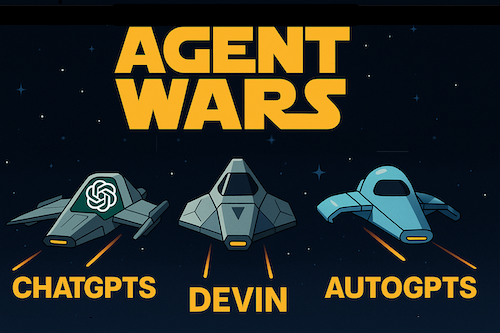February marks the onset of what industry insiders began calling the “AI Agent Wars.”
The rapid rise of autonomous agents — AI systems that plan, reason, and execute tasks with minimal human intervention — pushed generative AI into new, ambitious territory.
Key contenders dominated headlines:
- OpenAI Custom GPTs: Customisable versions of ChatGPT with embedded instructions, memory, and API/plugin capabilities.
- Devin (by Cognition Labs): A task-oriented developer agent capable of writing, debugging, and deploying code from scratch.
- AutoGPT & AgentGPT: Open-source experiments enabling looped reasoning, task breakdowns, and action execution across environments.
These tools all claimed to be the next evolution of AI—moving from passive responders to autonomous collaborators. The big question? Could they deliver.
Where They Worked Well
- Test Automation: QA agents were configured to crawl staging environments, generate tests, log bugs, and even suggest fixes. Devin in particular showed strength in this area, integrating seamlessly with GitHub Actions and CI/CD pipelines.
- Marketing Operations: Agents wrote, scheduled, and analysed newsletter campaigns, adjusting frequency and format based on performance data.
- Internal IT Tasks: Some enterprises deployed agents to monitor Slack channels, triage support tickets, and interface with internal wikis to deliver contextual answers.
Agent Architectures Matured The best-performing agents adopted a layered architecture:
- Planner: Broke down goals into subtasks
- Executor: Ran specific API calls, CLI commands, or code snippets
- Memory: Stored intermediate context between steps
- Feedback loop: Analysed output against goals and retried if necessary
Tools like LangGraph, CrewAI, and Autogen provided orchestration frameworks for managing multi-agent systems with clear task boundaries and escalation paths.
New Stack Components Emerged
- Vector Stores (e.g. Weaviate, Qdrant): Supplied agents with retrievable memory and document context
- Toolkits (e.g. Function calling, plugins, REST wrappers): Let agents interact with real-world systems
- Model Governance: Log actions, track decision chains, and monitor for hallucinations or unsafe behaviours
What Didn’t Work Despite the excitement, February showed agents still have limitations:
- Cost blowout: Long-running agents could rack up thousands in API charges with little output
- Looping errors: Recursive planning gone wrong led to stuck agents or irrelevant task chains
- Security gaps: Open agent frameworks often lacked sandboxing, making real-world deployment risky
As a result, most successful agent deployments were in closed environments with constrained task scopes, such as:
- Writing unit tests
- Filling templated reports
- Monitoring for config drift
The Developer Community Reacts GitHub exploded with agent templates. Some startups launched agent marketplaces. Others open-sourced their frameworks for benchmarking:
- Agent battle arenas
- Prompt-tuning contests
- Structured evaluation leaderboards
Still, hype outpaced stability. And while Devin was impressive, most teams found utility in domain-specific, single-agent systems rather than generalist AGI-style setups.
Enterprise Hesitation CIOs loved the vision—but required:
- Action logging for audit compliance
- Role-based control over tool execution
- Rate limiting and timeout management
Without these guardrails, few were willing to give agents write access to live systems.
What’s Next? Expect continued refinement in:
- Agent frameworks with interrupt and retry protocols
- SaaS platforms offering drag-and-drop agent construction
- Integration of agents into workplace tools (Notion, Salesforce, ServiceNow)
February 2025 showed that autonomous agents are more than hype. They’re real, usable, and improving rapidly.
But they also reminded us: with great autonomy comes great responsibility.
The race is on to build the stable, trustworthy, enterprise-ready agents of tomorrow.

No responses yet